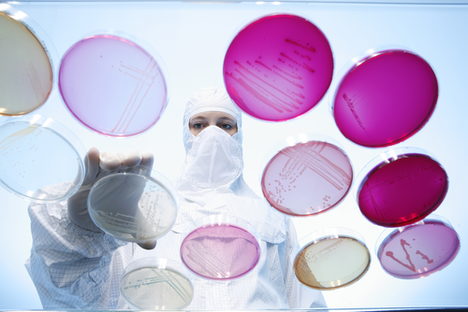Mainz Research Landscape
University, two universities of applied science, two Max-Plack-Institutes, institutions of the Fraunhofer-Gesellschaft and the Helmholz-Gesellschaft: von der Chemie der Atmosphere to microtechnology, from media convergence to clusters for individualized immune intervention (CI3).
Then there is university medicine, which offers medical care at the highest university level: in 60 specialist clinics, institutes and departments, with 3,300 students and around 7,500 employees. It is one of the largest employers as well as the growth and innovation engine of the region's health economy.
The Max Planck Institute for Chemistry in Mainz is one of
the oldest member institutes of the Max Planck Society and
deals with current scientific issues. For example, it inves-
tigates the wide range of interactions between air, water,
earth, life and climate. One of the main objectives of the
Institute is to find out how pollution influences the environ-
ment and human health.
Another important field of activity is being investigated by
the Max Planck Institute for Polymer Research. We encounter
polymers every day in all kinds of forms; these materials
form the basis of modern plastics. From creative design of
new materials through their synthesis in the laboratory to
their physical characterisation, the Max Planck Institute for
Polymer Research combines all the scientific competences
it requires.
The Fraunhofer Institute for Micro-Technology carries out
research and development in the fields of chemistry and
energy technology and analytical systems and sensors.
These activities focus on sustainable management and ener-
gy, healthy living, intelligent mobility and civil security.
The Institute of Molecular Biology (IMB) is a new centre of
excellence of the Boehringer Ingelheim Foundation. Its
research activities focus on a better understanding of human
development, the aging process and the causes of disease.
A worldwide research project that is accelerating research
into climate change has been initiated by Siemens, the Linde
Group, the Rhine-Main University of Applied Science and
the Mainz City Utilities department. At a research centre that
is unique around the world located in the Mainz Energy Park,
hydrogen is produced by electricity generated by wind-pow-
er: the aim is to store wind and solar-generated power in
the form of hydrogen and methane using the “power to gas”
method.


